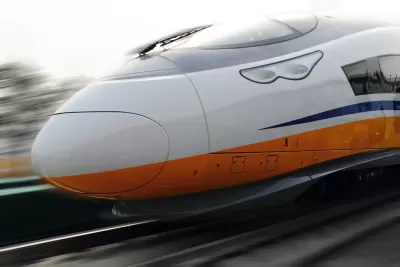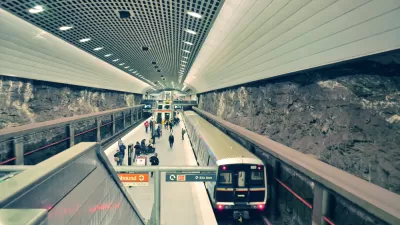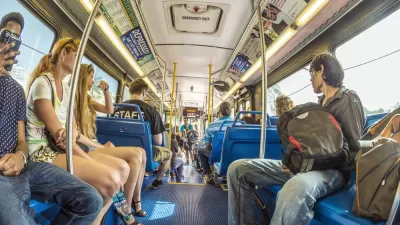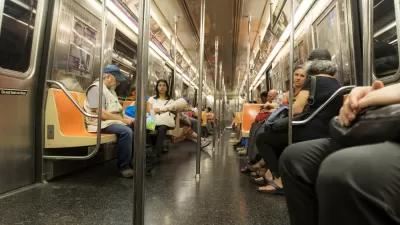Several decades ago, public transit was a distinctly low-quality way of getting around. Now, if we can believe TV and movies depicting the near future, all that has changed. Transit has become aspirational.

Asian and European entertainment often depicts subways, buses, even high-speed rail as part of the fabric of daily living, without comment or irony. We aren't quite there yet, but according to Alex Marshall, the American consciousness around public transportation has shifted since the 1970s. Now it's cool.
Marshall begins with a quote from Robert Pirsig's Zen and the Art of Motorcycle Maintenance (published in 1974), classifying public transit alongside G.I. shoes and basic cereals: as the essence of "square," of "bad quality."
That perception has changed. "Pirsig's comment highlighted for me the gradual transformation in how we regard public transportation. It is now seen as part of an urban lifestyle, and this has affected how it is portrayed in popular culture. Public transportation now symbolizes not a quality-less realm but the contrary, a sign of the good life or a thrilling component of a possible future."
In modern movies and TV like "Human Target," "Mr. Robot," and Her, the near future is a time of gleaming trains. To many of us, good public transportation has become something to aspire to. "Because it's about more than tracks and trains. It's about the definition of how you want your city to be; it's about quality in the Pirsig sense."
FULL STORY: From 'Her' to 'Mr. Robot': Movies and TV Make Public Transit Hip

Alabama: Trump Terminates Settlements for Black Communities Harmed By Raw Sewage
Trump deemed the landmark civil rights agreement “illegal DEI and environmental justice policy.”

Planetizen Federal Action Tracker
A weekly monitor of how Trump’s orders and actions are impacting planners and planning in America.

The 120 Year Old Tiny Home Villages That Sheltered San Francisco’s Earthquake Refugees
More than a century ago, San Francisco mobilized to house thousands of residents displaced by the 1906 earthquake. Could their strategy offer a model for the present?

In Both Crashes and Crime, Public Transportation is Far Safer than Driving
Contrary to popular assumptions, public transportation has far lower crash and crime rates than automobile travel. For safer communities, improve and encourage transit travel.

Report: Zoning Reforms Should Complement Nashville’s Ambitious Transit Plan
Without reform, restrictive zoning codes will limit the impact of the city’s planned transit expansion and could exclude some of the residents who depend on transit the most.

Judge Orders Release of Frozen IRA, IIJA Funding
The decision is a victory for environmental groups who charged that freezing funds for critical infrastructure and disaster response programs caused “real and irreparable harm” to communities.
Urban Design for Planners 1: Software Tools
This six-course series explores essential urban design concepts using open source software and equips planners with the tools they need to participate fully in the urban design process.
Planning for Universal Design
Learn the tools for implementing Universal Design in planning regulations.
Clanton & Associates, Inc.
Jessamine County Fiscal Court
Institute for Housing and Urban Development Studies (IHS)
City of Grandview
Harvard GSD Executive Education
Toledo-Lucas County Plan Commissions
Salt Lake City
NYU Wagner Graduate School of Public Service





























